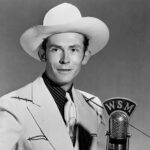Joe Cocker, the raspy-voiced maestro from Sheffield, England, wasn’t just a singer; he was an interpreter of songs, a musical alchemist who could transmute existing tracks into soulful, blues-infused anthems that resonated deeply with audiences worldwide. While he penned some of his own material, Cocker’s legacy is largely built upon his unparalleled ability to reimagine and revitalize the works of other artists. This article delves into some of the most iconic Joe Cocker Songs, exploring the magic he brought to each performance and why his versions often eclipsed the originals in popular consciousness.
Feeling Alright

“Joe Cocker performing ‘Feeling Alright’ on The Ed Sullivan Show, showcasing his energetic stage presence and soulful vocal delivery.”
Traffic, the ’60s folk-rock band, may have first laid down the tracks for “Feeling Alright,” but it was Joe Cocker’s electrifying cover in 1969 that truly ignited the song’s fame, especially in the United States. Cocker transformed the laid-back groove into a powerful, gospel-tinged rocker, propelled by his signature raw vocals and dynamic stage presence. The song’s infectious energy made it a staple of his live performances and a defining track in his early career. Interestingly, Huey Lewis, known for his ’80s pop-rock hits, also recorded his own rendition for the movie Duets in 2000. Years later, in 2012, the musical paths of Huey Lewis and Joe Cocker converged when they performed a duet of “Feeling Alright” on Jimmy Kimmel Live, bridging generations of music lovers.
Woman to Woman

“Joe Cocker’s ‘Woman to Woman’ album cover art from 1972, highlighting the blues rock aesthetic of his self-titled release.”
From his self-titled 1972 album, “Woman to Woman” is a prime example of Cocker’s blues-rock sensibilities. This track isn’t just notable for its raw energy and Cocker’s passionate vocals; it’s also instantly recognizable thanks to its distinctive guitar riff. This riff has achieved a life of its own, sampled in numerous songs over the years, most famously in 2Pac’s iconic hip-hop anthem, “California Love” in 1996. This unexpected connection highlights the enduring appeal and influence of Joe Cocker’s music across genres and generations.
Cry Me a River

“Joe Cocker passionately singing ‘Cry Me a River’ in a live performance, demonstrating his ability to infuse classic songs with raw emotion.”
“Cry Me a River” is a classic torch song that has been interpreted by a vast array of artists, from Julie London’s sultry jazz rendition to Michael Bublé’s contemporary swing version. However, Joe Cocker’s 1970 take on this standard is often overlooked, which is a disservice to his unique talent. Cocker’s version strips away the traditional sentimentality, injecting it with a raw, bluesy grit that transforms it into a powerful lament of heartbreak and defiance. His interpretation underscores his mastery at taking familiar songs and completely reinventing them in his own distinctive style.
Unchain My Heart

“Joe Cocker performing ‘Unchain My Heart’ live in 2002, showcasing his enduring stage presence and signature movements.”
Ray Charles, the “Genius of Soul,” originally recorded “Unchain My Heart” in 1961. Yet, Joe Cocker’s 1987 cover proved to be another stroke of genius in his career of masterful interpretations. Released on the album of the same name, “Unchain My Heart,” Cocker’s version brought a rock edge to the soul classic. While initially released in 1987, it found renewed success and became a UK Top 20 hit upon its re-release in 1992, demonstrating the song’s timeless appeal and Cocker’s enduring popularity.
Delta Lady
“Joe Cocker in a 1969 performance of ‘Delta Lady’, capturing the soulful energy of his early career and second album.”
“Delta Lady,” penned by the acclaimed songwriter Leon Russell, became a signature song for Joe Cocker after he recorded it for his second album, Joe Cocker!, in 1969. This soul-rock gem showcased Cocker’s vocal prowess and Russell’s songwriting brilliance, resulting in a UK Top 10 hit for Cocker. The song is a testament to the fruitful collaborations that defined Cocker’s career, where he consistently chose exceptional material and elevated it with his unique vocal delivery.
You Can Leave Your Hat On

“The official music video for Joe Cocker’s ‘You Can Leave Your Hat On’, known for its playful and suggestive imagery.”
Randy Newman, known for his wry and often satirical songwriting, wrote “You Can Leave Your Hat On.” However, it was Joe Cocker’s rendition that catapulted the song into popular culture. Featured in the steamy striptease scene of the 1986 film 9½ Weeks, Cocker’s version became synonymous with sensual and playful provocation. The song enjoyed a second wave of popularity when Tom Jones, the Welsh icon, covered it for The Full Monty soundtrack, also used in a memorable striptease scene, cementing its status as the go-to song for on-screen seduction, thanks in large part to Cocker’s definitive version.
You Are So Beautiful

“Joe Cocker performing ‘You Are So Beautiful’ in a ‘nearly unplugged’ setting, highlighting the raw emotion in his ballad interpretations.”
Billy Preston, a musical prodigy who collaborated with The Beatles and many other legends, co-wrote and first recorded “You Are So Beautiful” in 1974. But it was Joe Cocker’s raw, emotionally charged rendition of this ballad that transformed it into a global hit. Ironically, Preston initially wrote the song about his mother, a stage actress. His friend Sam Moore later recounted Preston’s dismay upon learning that Moore was using the song to woo women, as Preston had intended it as a heartfelt tribute to maternal love. Despite its origins, Joe Cocker’s version became a staple of romantic compilations and a beloved love song worldwide, showcasing Cocker’s ability to connect with listeners on a deeply emotional level.
Up Where We Belong (with Jennifer Warnes)

“Joe Cocker and Jennifer Warnes performing ‘Up Where We Belong’ in 1983, a powerful duet that became a movie anthem.”
Before Jennifer Warnes achieved iconic status with “(I’ve Had) The Time of My Life” from Dirty Dancing, she teamed up with Joe Cocker for another unforgettable movie anthem: “Up Where We Belong.” Recorded in 1982 for the climactic scene of An Officer and a Gentleman, the duet became an instant classic, boosted by the film’s massive success and Richard Gere’s unforgettable uniform. Warnes herself was instrumental in bringing Cocker on board for the project, having been a long-time admirer of his work. She recognized his unique vocal power and knew he was the perfect partner to create the song’s soaring emotional impact, marking a significant moment in Cocker’s comeback after his struggles with substance abuse.
With a Little Help from My Friends

“Joe Cocker performing ‘With a Little Help from My Friends’ at Woodstock in 1969, a defining performance of his career and the festival.”
Covering a Beatles song while the Fab Four were still active was a bold move, but Joe Cocker didn’t just cover “With a Little Help from My Friends”; he completely redefined it. Originally a relatively simple, Ringo Starr-led track, Cocker transformed it into a soul and blues powerhouse. Featuring Jimmy Page on guitar, Cocker’s Woodstock performance of the song became legendary, capturing the raw energy of the era and solidifying his place in music history. Even Paul McCartney himself was blown away by Cocker’s rendition, expressing his eternal gratitude for turning a “simple” Beatles tune into a “soul anthem.” Beyond Woodstock, the song gained further recognition as the theme tune for the beloved TV series The Wonder Years, ensuring its continued presence in popular culture across generations.
Joe Cocker’s songbook is a testament to his extraordinary ability to take songs and make them his own. Whether breathing new life into covers or delivering his original tracks, his performances were always infused with a raw passion and soulful intensity that made him a truly unique and unforgettable voice in music history. His legacy continues to inspire and resonate with music lovers around the world.


